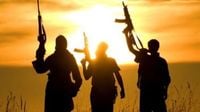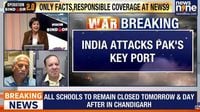In a shocking escalation of violence, the Balochistan Liberation Army (BLA) has claimed responsibility for a deadly attack on a Pakistani military convoy in Balochistan, resulting in the deaths of at least 14 soldiers, including high-ranking officers. The attack, which involved an improvised explosive device (IED), took place on May 8, 2025, in the Mach area of Kachhi district.
According to a statement from the Pakistan Army, the vehicle was targeted during a sanitization operation aimed at rooting out insurgents in the region. The BLA released a video showing the moment the military vehicle exploded, asserting that 12 soldiers were aboard at the time. The military confirmed that the blast killed 14 soldiers, including Special Operations Commander Tariq Imran and Subedar Umar Farooq, and completely destroyed the vehicle.
“Terrorists belonging to the Balochistan Liberation Army targeted a security forces’ vehicle with an improvised explosive device in the general area Mach, Kachhi district,” news agency PTI quoted a Pakistan Army statement as saying.
This attack is part of a broader pattern of violence in Balochistan, a province that has been embroiled in conflict for nearly two decades. Local ethnic Baloch groups have long accused the federal government of exploiting the region's rich mineral resources while neglecting its people. The BLA's recent actions highlight the ongoing insurgency that has intensified in recent months.
Just days before the convoy attack, on May 2, 2025, the BLA launched a violent ambush on a police-escorted prison van in Kalat district. Around 30 to 40 armed militants intercepted the transport, and while the prisoners were eventually released, five police officers were taken hostage, according to a senior police official quoted by AFP.
Adding to the turmoil, on May 9, 2025, the BLA attacked a military post in Quetta, coinciding with a major drone strike by Indian forces on Karachi Port. Multiple explosions were reported across key areas, indicating that Islamabad is now facing threats on multiple fronts, with major cities including Karachi, Sialkot, and Lahore under attack. The BLA also blew up a major gas pipeline, which could severely impact Pakistan's energy supply.
The BLA's spokesperson, Jeeyand Baloch, issued a statement taking responsibility for the attacks and criticized the Pakistani military, labeling it a mercenary force. “The hired killers who call the Baloch Liberation Army a foreign proxy should know that the Pakistani army itself is a mercenary armed gang that thrives on Chinese capital,” he said. He further claimed that the army's role shifts according to the interests of foreign powers, casting doubt on its legitimacy as a national force.
The BLA's recent operations underscore the persistent and deep-rooted conflict in Balochistan, where separatist groups have long accused the Pakistani state of marginalization and economic exploitation. Despite the province's abundant natural resources, local communities continue to face poverty and political exclusion, with benefits allegedly funneled to the federal government and foreign investors.
The Pakistani military's heavy deployment in Balochistan is perceived by many locals as a suppressive presence, which fuels resentment and sustains the insurgency. The disconnect between Baloch nationalist aspirations and Islamabad's policies remains a key source of instability in the region.
In March 2025, the BLA made headlines by hijacking the Jaffar Express, a train carrying 440 passengers, in a dramatic incident that resulted in the deaths of 21 civilians and four soldiers. This incident further highlighted the group's operational capability and reach, raising concerns about the security situation in Balochistan.
Security forces in Pakistan have increasingly come under fire from separatist factions like the BLA, who often target personnel originating from Punjab and other provinces, accusing them of occupying Baloch lands. The provinces of Balochistan and Khyber Pakhtunkhwa continue to be among the most volatile in the country, witnessing a surge in attacks on military and paramilitary forces.
Pakistan maintains that groups such as the BLA receive support from across the border in Afghanistan. Islamabad has accused the Taliban regime of providing shelter, funding, and logistical support to anti-Pakistan elements, enabling them to conduct cross-border terrorism and spread unrest within Pakistan’s borders. The situation remains tense, with the potential for further violence as the BLA continues its campaign against the Pakistani state.
In light of these developments, the BLA's attacks serve as a stark reminder of the ongoing conflict in Balochistan and the challenges facing the Pakistani government in maintaining stability in the region. As the insurgency intensifies, the need for a comprehensive approach to address the grievances of the Baloch people becomes increasingly urgent.


